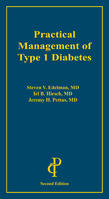Endocrinology
Presents a state of the art review of the various insulin preparations, delivery systems, and appropriate treatment regimens for the patient with type 1 diabetes. Continuous subcutaneous insulin infusion, monitoring of glycemic status (including the latest devices for continuous glucose monitoring), and blood glucose data technology for pattern management are reviewed in detail. Glycemic, lipids, and blood pressure goals are presented. Separate chapters are included on epidemiology, pathogenesis, diagnosis, diet, and exercise recommendations, along with management of acute and long-term complications. A new chapter on inpatient management has been added to the new edition.
Steven Edelman, MD, is Professor of Medicine at UCSD; Irl Hirsch, MD, is Professor of Medicine at the University of Washington; and Jeremy Pttus, MD, is Assistant Professor of Medicine at UCSD. All three authors have type 1 diabetes themselves and have dedicated their careers to treating and educating others with diabetes.
Diagnosis and Management of Type 2 Diabetes 14E provides a practical, concise guide to the management of type 2 diabetes. All available oral and injectable anti-diabetic agents are reviewed in the book with separate chapters for each class of oral agents, insulin therapy, and glucoregulatory hormones. Key clinical trial data on each of the available agents is presented in detail, along with current prescribing guidelines and CV safety and benefit trial data. The book contains a treatment algorithm for initial treatment of type 2 diabetes. Nonpharmacologic measures, treatment of micro- and macrovascular complications, and a review of the diabetes prevention trials are also presented in the book.

.jpg)